Why combating hypertension is a huge challenge
Officials, doctors and residents explain the reasons behind the growing medical problem
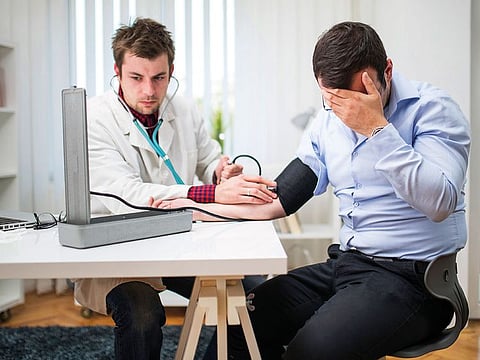
DUBAI
A day after the Ministry of Health and Prevention issued the updated 2019 guidelines to combat hypertension through preventive screening, awareness and management of the condition, officials and healthcare professionals highlighted the mammoth challenge associated with the problem. In an exclusive interview with Gulf News, Dr Buthaina Abdulla bin Belaila, head of the Supreme Committee of Control of Non-communicable Diseases Department at the Ministry of Health, said : “Hypertension is a public health challenge in the UAE because it directly increases the risk for Cardiovascular Disease (CVD) and stroke.
Overall, the prevalence of hypertension among adults was found to be 28.8 per cent according to the UAE National Health Survey. The prevalence of hypertension usually increases with age. According to health survey 2018, most patients with hypertension are in age group of 30-44 years old, which is lower compared to the international average.”
The survey results have sent alarm bells ringing in the health ministry because hypertension has skewered the goals of the National Health Agenda 2021 and compounded the financial burden of disease management is the country
What do the international guidelines say?
The updated guideline are in tandem with the guidelines issued but he European Society of Cardiology (ESC) and the European Society of Hypertension (ESH).
According to the ESC/ESH guidelines, optimal blood pressure reading is 120/80 mmHg, anything in the range of 121-129/ 80-84 mmHg is considered normal; 130-139/ 84-89mmHg is considered high normal and a reading of 140- 159/ 90-99 mmHg is considered stage 1 hypertension; it goes on to stage two and three with escalation in the readings. Medication is required from stage I onwards while the earlier readings can be improved with diet and lifestyle changes, cessation of smoking, reduction of salt and alcohol and better physical exertion. These changes can not only delay the onset of hypertension, but actually reverse the symptoms in many cases say doctors.
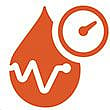
What is high blood pressure?
The normal human body contains about 4.5 – 5.5 litres of blood which is pumped by the heart into the entire body and this is the most important aspect of our circulatory system. Blood pressure is the pressure of the circulating blood in the walls of blood vessels and here the focus is mainly on the arteries or the arterial blood pressure.
How is blood pressure measured?
Blood pressure is measured with a sphygmomanometer and records two readings – the systolic or top reading is the pressure when the heart is pumping the blood and diastolic is the pressure when the heart is resting between two beats. The unit of measurement is millimetre of mercury (mmHg)
Why does BP go up?
“More than 97 per cent cases of hypertension are idiopathic (unknown causes) while three per cent cases are attributed to a genetic or family history,” said Dr Arun Goyal, senior cardiac surgeon at the RAK Hospital.
However, blood pressure changes happen due to change in the viscosity of blood or the thickening of arteries causes blood circulation to slow down. The pressure goes up as the heart has to pump harder to facilitate normal circulation.
More than 97 per cent cases of hypertension are idiopathic (unknown causes) while three per cent cases are attributed to a genetic or family history.
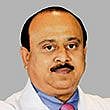
According to Dr Fekry Al Deeb, senior consultant interventional cardiologist at Zulekha Hospital, the main culprits are obesity, bad eating habits, sedentary lifestyle, smoking, alcohol consumption and stress.
Stress also has a big role to play as it releases adrenalin and cortisol in the blood… We find patients in the 20-30 age group diagnosed with hypertension because of poor lifestyle and high stress…
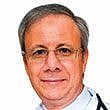
“When the blood viscosity goes higher, the heart has to pump harder and the blood pressure goes up. When people smoke, have alcohol or high transfat food, the arteries thicken leaving less space for the blood to circulate. It is like when the mouth of a hose is constricted and the water comes out with higher pressure. Similarly, when the artery walls thicken, the pressure of the blood goes up to ease circulation. High sodium foods cause water retention and when the body is unable to pump out the water, circulation gets beleaguered and pressure rises. Stress has a big factor to play as it releases adrenalin and cortisol in the blood again causing high pressure. We find younger patients in the age group of 30-20 being diagnosed of hypertension because of poor lifestyle and high stress issues.”
How can pressure be normalised without medication?
Prior to becoming a chronic patient of blood pressure, one can easily reverse these symptoms with regular exercise that makes the blood go down to the limbs relieving the central pressure, and by eating healthy, cutting out any stimulants that can cause the arteries to thicken, said the doctors.
Nutritionist’s view
Rouba Elhourani, head dietician at RAK Hospital, said: “Today most young people in the corporate world lead highly stressed lifestyles and have meals on the go. They might order a salad thinking it’s healthy but heavy dressings on it are fattening. The maximum intake of salt in one’s food is not meant to exceed beyond 2,300mg per day, which is roughly one teaspoon. In addition, all the sauces, chips, processed and canned foods have high salt and sugar content. So people far exceed the stipulated salt amount resulting in water retention and obesity. Similarly having processed foods like biscuits and baked items too exposes a person to transfats and all these are very harmful. They result in obesity and high Basal Metabolic Index (BMI) which directly impacts one’s blood pressure and heart health.”
The maximum intake of salt in one’s food is not meant to exceed 2,300mg per day, which is roughly one teaspoon.
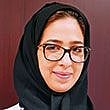
BMI is the body’s ability to burn calories while resting.
Dr Belaila from the Health Ministry had introduced the pdated guidelines which are meant to raise awareness about making lifestyle changes in time and going in for preventive hypertension screening from the age of 30 to prevent a negative diagnosis.
“This updated publication of the Clinical Practice Guidelines (CPG) for hypertension in primary health care (PHC) incorporates the new updates in the international guidelines and tailors this to our settings in the Ministry of Health and Prevention. Hypertension continues to be a worldwide public health problem with increasing burden on all health sector resources. Preventing hypertension, diagnosing it early and treating it properly is a goal that all health care systems in the world are working for,” the official concluded.
Resident Case Studies

Anwar Hussain: On the road to recovery
Hussain, a Bangladeshi expat in UAE working as an insurance coordinator, was diagnosed with hypertension four years ago at the age of 27. “I have a family history of hypertension with both my parents being patients on hypertension. While they were diagnosed at the age of 50, in my case the disease manifested 25 years earlier. In the beginning I had no idea why I had this severe cervical pain, heavy head, throbbing temples, dizziness and felt drowsy all the time,” recalled Hussain who had a reading of 180/110 mmHG and was immediately prescribed medication.
“My job does not permit me to find time to be active or exercise. Besides I was having burgers, pizzas and heavy oily food from my college days and was an occasional smoker. After the diagnosis, I cut out junk food from my life and with one single pill a day have managed my blood pressure pretty well. I closely monitor it now and it is in the range of 130/90. I know because of my genetic history, I can control it but not completely eradicate it. But timely screening has helped me be more vigilant about it now.”
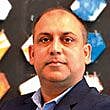
Kowshik Mukherjee: Dramatic lifestyle turnaround.
Mukherjee, 45, a marketing consultant, was diagnosed with hypertension at the age of 35. Attributing his hypertension to extreme stress, Mukherjee said: “As a young marketing personnel in the corporate world, the targets to chase and the stress had completely thrown my work life balance off the keeler,” recalls Mukherjee whose first reading at the clinic was 150/ 120.
“Despite a full night’s sleep I always felt sleep deprived and had palpitations, headache dizziness and felt completely drained out. The single daily pill I was prescribed was effective and it brought down my pressure in the range of 130/90. My physician was glad as it did not fluctuate. For seven years I had the pill and one fine day I decided it was time for me to change my lifestyle,” recalls Mukherjee.
He made three alterations to his lifestyle: reduced eating out, began having home cooked meals with a lot of fresh ingredients, threw out sea salt and switched to rock salt, began exercising for an hour daily at least five days a week and completely changed his attitude to work. “My exercise routine involves 45 minutes of brisk walking on the treadmill and 15 minutes of yoga stretches. I have stopped trying to control everything in life and take one day at a time.. if a client is upset I do not let it upset me. I do my best and leave it that. Believe me these three changes have made a dramatic turnaround in my health. I gave up my hypertension medication a year ago and my blood pressure is steady at 124./ 85. I make it a point to visit my doctor and monitor it closely but am glad I was able to conquer this demon.”
Lifestyle Dos and donts
Source : Rouba Elhourani.


